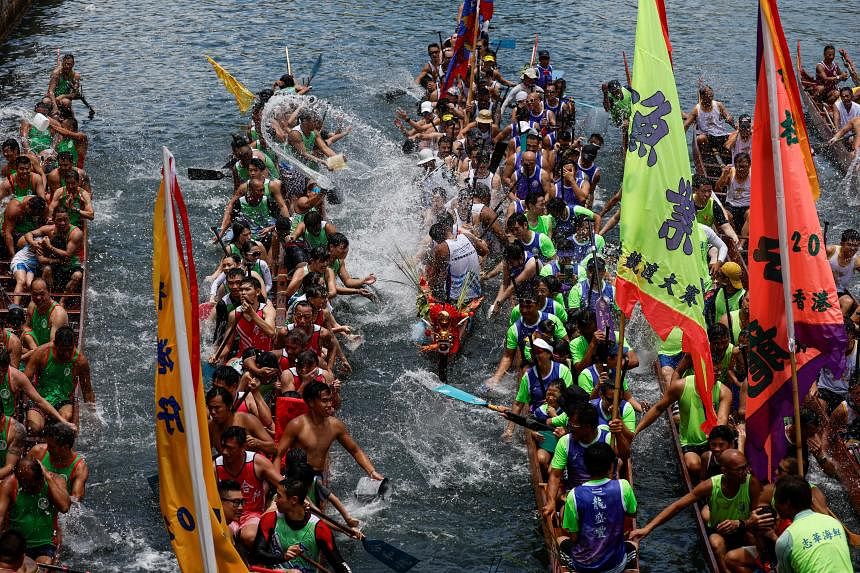HONG KONG - Hong Kong’s famous Dragon Boat Festival drew thousands of spectators on Thursday, reviving the tradition after the city’s coronavirus restrictions forced reduced celebrations, postponements and crowd bans.
“During the pandemic, I watched the races on TV, but of course it’s more fun to be here,” Mr Cheuk Shum, 43, told AFP.
“The event is experienced differently on a screen, you don’t feel the atmosphere.”
The Hong Konger said he attended the festival, also known as Tuen Ng in Cantonese, for eight years before the city imposed some of the world’s harshest measures to stop the spread of Covid-19.
This year, the crowds were able to return to the sands of the main beach in Stanley – an upmarket seafront neighbourhood – after anti-virus measures were completely lifted in March.
“The festival has never ceased to exist, even during the Covid years,” Mr Jack Lam, a volunteer organiser for more than 10 years, told AFP.
“We’d kept the event on a much smaller scale, but it wasn’t the same atmosphere,” he said.
Despite the muggy weather and a temperature of over 30 deg C, people began arriving at 8am, hours before the official start of the race, which was first held in 1976.
Under the scorching sun, 174 rowing teams competed aboard long boats topped by brightly coloured dragon heads.
‘Sorely missed’
Some teams in this year’s festival were taking part for the first time.
“This type of event and Hong Kong’s cultural life were sorely missed during the pandemic,” said Mr Christian Wertheimer, a Brit who arrived in Hong Kong in 2018.
“At the time, I was on a trip to Japan during the festival, and afterwards... Covid, Covid, Covid”, he said.
Celebrated on the fifth day of the fifth month of the lunar calendar, the Dragon Boat Festival is a centuries-old Chinese tradition that was classified by Unesco in 2009 as intangible cultural heritage.
The holiday, observed in China, Hong Kong, Taiwan and Macau, is by local lore a commemoration of Qu Yuan, a Chinese poet of the Warring States period who is said to have drowned himself in a river after being falsely accused of treason.
“On hearing of his death, villagers reportedly rushed into the water and rowed out in search of his body, to no avail,” Mr Lam, the volunteer, said.
“They then prepared ‘zongzi’ (balls of sticky rice wrapped in bamboo leaves) to keep the fish away from his remains, and threw them into the river”.
Today, eating and sharing the dish remains a notable part of the celebrations. AFP

